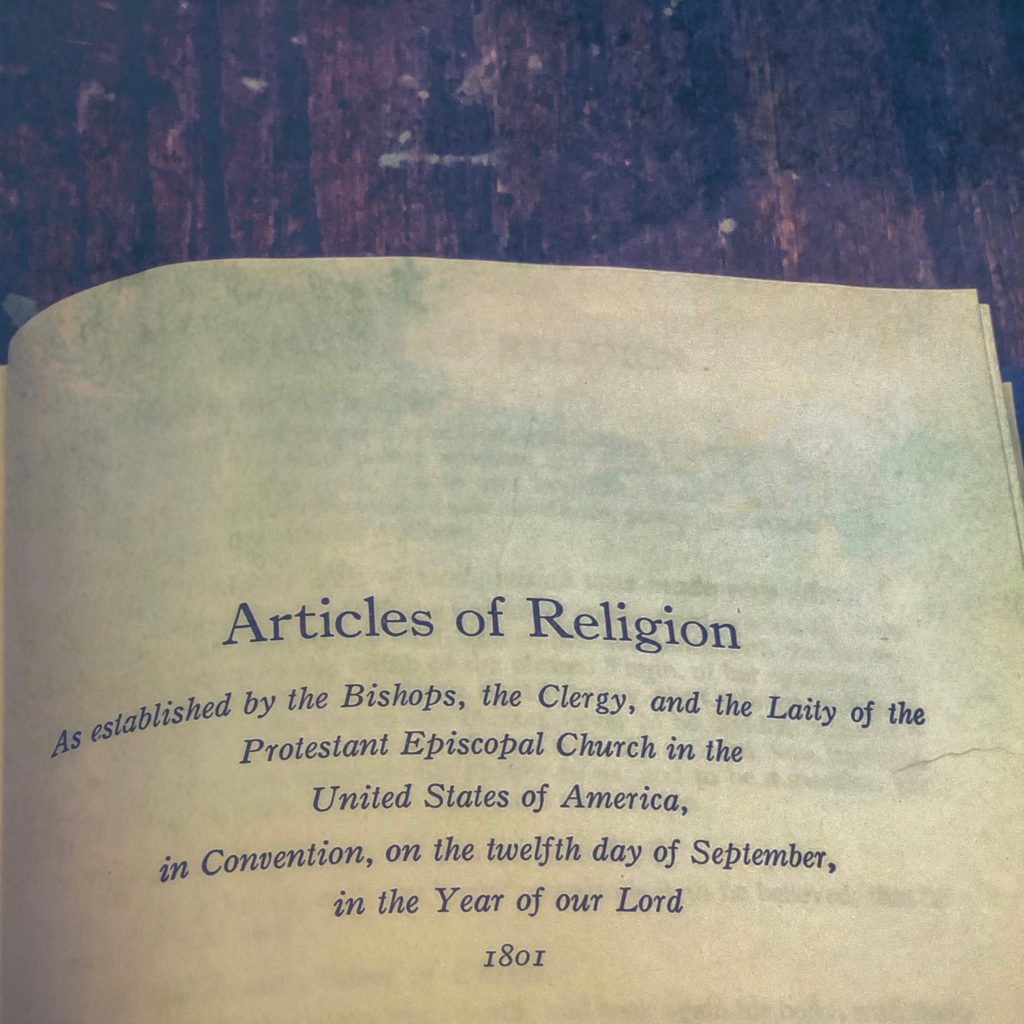
The Church hath power to decree Rites or Ceremonies, and authority in Controversies of Faith: and yet it is not lawful for the Church to ordain anything that is contrary to God’s Word written, neither may it so expound one place of Scripture, that it be repugnant to another. Wherefore, although the Church be a witness and a keeper of Holy Writ, yet, as it ought not to decree any thing against the same, so besides the same ought not to enforce any thing to be believed for necessity of Salvation.
by the Rev. Canon David Ketter
When I was in my first year in seminary, I was attending a church plant that was committed to worship according to the Book of Common Prayer. They used a modern language 1662 for worship. I loved it. I also wasn’t confirmed, and I had no intentions of asking to join the Anglican Communion. My goal was strictly pragmatic—figure out the strong points of their church planting strategy, the ways they introduced people to worship, and brought people from first-time in attendance to participating in the life of the congregation. I went to seminary on the priest’s recommendation to further that same pursuit. And while there, I started crafting my own liturgy. I enjoyed most of the service from the BCP, but I wanted some adjustments: a liturgical calendar that recognized its Jewish roots, a lectionary that was whole-Bible, and some more obviously Celtic content (I will fully admit that I was one weird seminarian—at least that first year).
The project was abandoned by the end of that year, not for lack of interest, but because I did get confirmed. The rhythms of the Anglican way—the cadence that Dr. Packer has described as sin-grace-faith, where we confess our sin, receive God’s grace, and faith is born and expressed in words announcing Christ—had begun rerouting my spirituality. Confirmation meant, among other things, that I was submitting myself to the authority of the Church. Rather than being a rogue church planter with a unique liturgical agenda, I surrendered to the wisdom and counsel of many others seeking to live under the Word of God over many centuries.
Article XX, in full, reads:
The Church hath power to decree Rites or Ceremonies, and authority in Controversies of Faith: and yet it is not lawful for the Church to ordain any thing that is contrary to God’s Word written, neither may it so expound one place of Scripture, that it be repugnant to another. Wherefore, although the Church be a witness and a keeper of Holy Writ, yet, as it ought not to decree any thing against the same, so besides the same ought it not to enforce any thing to be believed for necessity of Salvation.
Like many of the Articles of Religion, Article XX was transferred almost unchanged from the Forty-Two Articles authored by the Anglican reformer, Thomas Cranmer. In its original form, published together with the 1552 Book of Common Prayer and catechism, the focus of Cranmer’s concern in writing is clear. “It is not lawful for the Church to ordain any thing that is contrary to God’s Word written.” The basis for Reformation in England, both in its limited degrees with Henry VIII and the much more aggressive reforms under Edward VI, was that the corruption of Christian worship and leadership in the Church had departed from obedience to Scripture. The many “superstitions” castigated by the Books of Homilies suggest that the worship of the Church in England did little to nothing to communicate the Scriptures to the people, and provided confusion and condemnation, when they ought to have received guidance and comfort from the Word of Christ.
In fact, Cranmer is addressing one of the fundamental questions of the Reformation—who has final authority over the Christian, the Church or the Scriptures? Along with the other Protestant formularies, the Articles of Religion firmly assert that this Divine appointment resides in the Scriptures upheld by the Apostles and the testimonies written by them (the Old and the New Testaments), rather than the Church led by the successors of the Apostles, the bishops. Cranmer is at pains to be clear on this: the Church may not ordain anything contrary to Scripture, nor turn one part of Scripture on another to overthrow its plain sense (since Cranmer, too, affirmed the perspicuity of Scripture). Finally, since the Church is the custodian of Scripture, it should not distort the Gospel of salvation by requiring things contrary to it, nor by adding requirements beyond those plainly expressed in Scripture.
What is fascinating about Article XX’s claims for the Church is that it crafts an ecclesiology (doctrine about the nature and activity of the Church) that is centered around the Holy Scriptures of the Old and New Testament. The Church as a body exists in submission to God’s Word written, but it is also charged with the responsibility to bear witness to the truthfulness of the Word, by faithfully declaring the means of salvation expressed there. In effect, the Church becomes the steward of the Divine, royal decrees. It is by no means a low view of the Church, even if it is perspective which has been chastened in the wake of Reformation protests to the late medieval corruptions.
For all these reasons, it is almost intuitive to read Article XX as being concerned with worship and doctrine. Bishop Matthew Parker’s addition to the Cranmerian original in 1571, “The Church hath power to decree Rites or Ceremonies, and authority in Controversies of Faith,” has strongly shaped the interpretation of this article in that direction. We would do well to consider, however, that the English Reformation was not simply a question of praying in English rather than Latin, but for the sake of clear proclamation of the Gospel and the instruction of all English people in the Scriptures. If we consider the opening lines of first sermon from the Book of Homilies, “A Fruitful Exhortation to the reading and knowledge of holy Scripture,” we find a familiar pattern:
“To a Christian man there can be nothing either more necessary or profitable, than the knowledge of holy Scripture, forasmuch as in it is contained God’s true word, setting forth his glory, and also man’s duty…And there is no truth nor doctrine necessary for our justification and everlasting salvation, but that is (or may be) drawn out of that fountain and Well of truth…Therefore as many as be desirous to enter into the right and perfect way unto God, must apply their minds to know holy Scripture, without the which, they can neither sufficiently know God and his will, neither their office and duty.”
This is the importance of neither contradicting, nor adding to, the revealed necessities in Scripture: it sets forth God’s glory and man’s duty, and without it we could not understand what is “necessary for our justification” (Article XI), and thus “know God and his will,” as well as our own “office and duty” (our human life and responsibilities). So, the Church is put in a custodial role in relationship to Scripture, not only for the sake of Christian worship, but for the sake of human life lived with faithfulness to the duties God has entrusted to us in the world. The Scriptures have something to say about our responsibilities in work, in friendship, in creation stewardship, in politics, in the arts, in marriage and family and life together. In other words, to quote the Rev. Tish Harrison Warren from a recent presentation at the Intersection 2019 conference (May 16-18, 2019), “The Church has a call to teach people to be more fully human.”
How does Article XX in its final form in the Thirty Nine Articles of Religion envision this? The Scriptural stewardship of the Church as a body is principally demonstrated in its authority to “decree Rites or Ceremonies” and decide “Controversies of Faith.” In submission to God’s Word written, the Church is called to teach people how to be human by teaching us how to know God—to be baptized, to hear the Scriptures, to receive the Sacraments, and to pray for our needs, for the suffering of those around us, and for those in authority. The Church, in the language of the Scriptures, teaches us to mark the seasons of life—thanksgiving after childbirth, the affirmation of faith and call to active ministry through confirmation, the blessing of marriage, the call to leadership in ordination, the grace of forgiveness in confession, the mercy of compassion and healing in sickness, and the bold confidence in Christ in the face of death itself. The Church bids us follow Christ in remembering his promise to return, by welcoming his birth and hailing the revelation of his light to the nations, by feeling the burden of our sins and the dust of our mortality, and setting our faces to Jerusalem with him as he walks to path to the Cross, Resurrection, Ascension, and the outpouring of the Holy Spirit as we seek to follow Jesus now, clothed with power from on high. The Church does these things, and by proper authority under the Scriptures of the Old and New Testament as the “norming norm.”
As heirs of the tradition of Cranmer and Parker, what does faithful Anglican affirmation of Article XX look like? Certainly, we ought to reinforce that the Church has authority under God’s Word written. But we must also acknowledge that the stewardship given the Church is often understated in the West. In a cultural milieu where liturgies and worship are so frequently adjusted on the basis of personal preferences and convictions, we would do well to remember that liturgy which is not conveying the Scriptures, and those things necessary to salvation, to all people is poor liturgy in need of reform. Finally, the Church’s work in worship and doctrine will impact our day to day life as Christians, commending the Scriptures to us to shape not only our character, but responsibilities and relationships within the world. In this submission, to the Scriptures, in the fellowship of the Church, we can make our prayer with sincerity and humility: “And we humbly ask you, heavenly Father, to assist us with your grace, that we may continue in that holy fellowship, and do all the good works that you have prepared for us to walk in; through Jesus Christ our Lord, to whom, with you and the Holy Spirit, be all honor and glory, now and for ever. Amen.”
The Rev. Canon David Ketter is a priest in the Anglican Diocese of Pittsburgh and associate campus minister with the Coalition for Christian Outreach. He has presented and written for the Anglican Multi-ethnic Network (AMEN) and Pneuma: the Journal of the Society for Pentecostal Studies. He also hosts a weekly podcast, Fighting with God, connecting God’s radical grace to everyday challenges.
